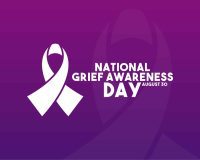
Whether you’re a friend or family member, coworker or acquaintance, it can be difficult to know what to say to someone who is terminally ill or in hospice. Here are suggestions from experts and patients on conversations, suggestions, and the basics on how to be with someone who is ill.
1. Don’t be afraid of saying the wrong thing.
There really are no “wrong words” to say but do avoid using clichés that sound trite or impersonal, such as “we all have to die someday”. Use your own thoughts and feelings if you are close to this person. Let them know how much you think about them and how much you have benefitted from knowing them.
Talking over the history of your relationship with your friend or family member can be a rich source of intimacy for both of you. It is also important to act as you always did with this person. For example, if cracking jokes or talking about sports was the center of your relationship, it is okay to keep talking about those things. Anything other than the way you would normally act with each other can make everyone feel awkward and seem like you aren’t being genuine. If nothing else, it is also perfectly okay to say, “I’m not sure what to say to you but I’m here for you, and I will keep being here as long as you want me to be.”
Don’t be afraid to ask them up front if it is okay to talk about a particular topic, such as, “Do you mind telling me what your thoughts are right now about what you’re going through? I’d really like to know,” or “I’d like to talk to you about what the doctor said earlier. Is that okay?” These questions should acknowledge the patient’s desire for self-sufficiency and emphasize a deep respect for their wishes.
Finally, remember that sometimes, just sitting with the person and sharing time with them can be just as fulfilling. They may not have enough energy to carry on a conversation or are feeling emotionally overwhelmed. You can even put on the TV and watch a program together, or listen to some music. The important thing is just being there.
2. Don’t say, “It’s going to be Okay”.
It’s an automatic and well-intended response, but don’t try to reassure a friend or loved one that everything will end up just fine. Suzanne Maxey, a former hospice nurse who is now battling an aggressive breast cancer says, “don’t tell someone who is ill that they’ll ‘beat it,”.
“That’s ridiculous,” she says. “I’ve been a hospice nurse for years. The type of breast cancer I have—triple negative—comes back sooner or later. And I don’t want to hear about your mother or close friend with stage one breast cancer who is now fine. That’s not what I’m dealing with right now.”
If you’re struggling for a way to say something meaningful, you can say, “I wish this wasn’t happening to you”, “This must be hard news for you to share”, or “I’m here for you.”
It is also okay not to address the illness directly but, “ask what you can do and to make sure the person knows you’re there and available,” says Kimberly Borzym, a chaplain at Advocate Hospice in Chicago.
3. Be as specific as possible about any ways you can help.
“People often say, ‘if you need anything, call me,’ but that puts the onus on the person dealing with the life-threatening disease,” says Rebecca Axline, a licensed clinical social worker at the Houston Methodist Neurological Institute. “Instead, say, ‘Can I bring a casserole by Thursday?’ or drop off a gift card for a massage or dinner at a local restaurant.”
“A funny card or email, a meal, picking up meds or coming over one day to wash our clothes, clean our kitchen or bathroom; that all means the world,” says Maxey. Her advice for helping someone in her position? “Don’t just tell us to call if we need help. Chances are we won’t ask, not wanting to be a burden. Help us without waiting to be asked. Believe me, it will be appreciated, both for the help and for the fact of not being forgotten.”
4. Be careful about saying, “I’ll pray for you”.
If you both belong to the same church or synagogue, and you know religion is an important part of a friend or acquaintance’s life. However, “it’s a mistake to assume that someone shares your spiritual beliefs,” says Jennifer FitzPatrick, a professor of gerontology at Johns Hopkins University and author of Cruising Through Caregiving: Reducing the Stress of
Caring for Your Loved One. This is particularly true if you are not sure about their views on death and the afterlife. If you are not sure about their religious beliefs, keep God, heaven, and other spiritual reassurances out of it.
5. Try to create a semblance of normalcy.
“We don’t want to just talk cancer, cancer, cancer!” says Maxey. “Boring! We want to talk about the latest Hollywood gossip, the crazy politicians, the funny reality TV shows.” Patients, too, need a break from their disease. “We want to go to lunch and shopping, but we just may not have the stamina to be out in the world for more than an hour or two,” says Maxey.
6. Ask how they’re doing—today.
The generic “How are you?” greeting can be tough for someone dealing with something like cancer. “Whenever anyone asked me that during treatment, I’d think, How much information do you really want? Because I can flood you,” says Breanna Wicker, area vice president of operations for the home health and hospice company Amedisys who is a breast cancer survivor as well.
A better question is to ask how they’re holding up. This allows them to share as much or little about themselves as they like. You can then take their cue and follow up with an invitation to help whether it is offering to drop off a meal later in the week, drive them to their doctor, or a treatment appointment.
7. Be present.
When having a conversation with a sick friend, it’s important to really be present. “Ask how they are doing, and then really listen to them without pulling away, either physically or emotionally,” says Nancy Molitor, a professor of psychology at the Feinberg School of Medicine at Northwestern University in Chicago. That means making eye contact, physically leaning in toward them, and being prepared to stay focused even when they go into more detail than you want to know.
You should also resist the urge to begin talking if there’s a moment or more of silence. “It gives the impression that you’re nervous and anxious and feel the need to fill the void,” notes Molitor. Your friend or loved one may feel comfort just being in the same room with you, knowing you are there for them.
8. Be a good listener about the end.
If someone you are close to wants to talk about end-of-life matters such as funeral arrangements, health care proxies, wills, and estates, let them. “If death is imminent, it can really take weight off of that person’s shoulders, even if the idea of picking out a casket seems morbid to you,” says Molitor. “These may be things that they’re afraid to discuss with their spouse or their children because they’re worried it’s too hard for them.” Knowing they can communicate wishes to you may provide them some relief.





5 Comments
I really like that you talked about just sitting with the patients and sharing quality time with them. My mom is having some health issues as she gets older and she needs more care. I think it’s time to get some in-home hospice care so that she can be looked after by professionals.
I love that you talked about a patient that has had cancer come back a few times. My mom is getting older and needs a lot of care throughout the day for her health issues. We need to find good hospice care so that she is well taken care of and can live a happy life.
My mom is now on hospice and it turns out that several of her hospice caregivers are people she knows and went to church with. That helps a great deal because I tell them it’s ok to talk about God and where my mom is going when her soul leaves her mortal body. The intake hospice nurse turned out to be someone my mom knew since the lady was 16 years old, my mom felt very comfortable.
My mom also has Alzheimer’s and we are having a hard time figuring out what she talks about is end of life things or just her symptoms of the Alzheimer’s.
The intake nurse also tiptoed around talking about what my mom wanted to be done with her body after she passed and my mom kept saying “what” and looked at her funny so I asked my mom to look at me, she did, then I asked her “when you’re spirit leaves this mortal body and dies, what do you want us to do with your body afterwards?” Mom mom said “oh, I get it now” then she told us. The hospice nurse was astonished and happy that I wasn’t hiding the fact my mom is dying. My mom knows it herself and would rather hear it talked about in a natural way, as a part of living everything dies and should be talked about as normal as possible. My sister hates it when I’m upfront with my mom but my mom is fine with it.
Donna,
Thank you for sharing your story. We wish you and your family words of strength and guidance as you travel this journey with your mom.
Thank you for these excellent suggestions. I have a dear friend going into hospice. She has a family with three children. I was overwhelmed thinking about how to talk to her, and show her I care, but not be intrusive.